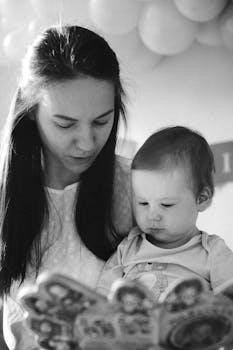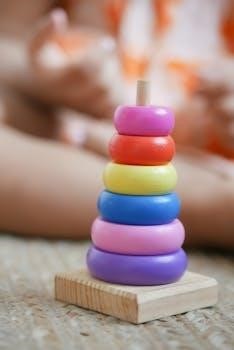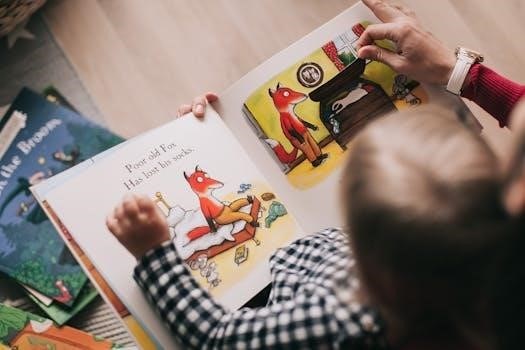
Iowa Early Learning Standards PDF⁚ An Overview
The Iowa Early Learning Standards (IELS) PDF document is designed for everyone who cares for, educates and works with young children in Iowa; The IELS provides guidance and support for early childhood professionals.
Purpose of the Iowa Early Learning Standards (IELS)
The primary purpose of the Iowa Early Learning Standards (IELS) is to promote optimal development and learning for all Iowa children from infancy through pre-kindergarten. These standards offer a framework that guides educators and caregivers in creating enriching experiences. The IELS aims to ensure that young children have opportunities to develop across various domains, including cognitive, social-emotional, and physical development.
Furthermore, the IELS are designed to support early childhood programs in implementing developmentally appropriate practices. By providing clear expectations for what children should know and be able to do at different ages, the standards facilitate effective curriculum planning and assessment. This ensures that children receive a high-quality early childhood education that prepares them for future success in school and life. The vision of Early Childhood Iowa is to make every child healthy and successful.
Target Audience of the IELS
The Iowa Early Learning Standards (IELS) are designed for a broad audience involved in the care and education of young children. This includes early childhood educators, preschool teachers, childcare providers, and home visitors. These professionals can use the IELS to inform their instructional practices and create developmentally appropriate learning experiences.
Additionally, the IELS are a valuable resource for families and caregivers. Parents can use the standards to understand what to expect from their child’s development and how to support their learning at home. Furthermore, the IELS are relevant for administrators and policymakers in the field of early childhood education. The standards help guide program development, curriculum design, and professional development initiatives. Ultimately, the IELS seek to benefit all stakeholders in the early childhood community.

Key Domains in the Iowa Early Learning Standards
The Iowa Early Learning Standards (IELS) encompass several key domains crucial for early childhood development. These domains provide a framework for understanding and supporting children’s growth across various areas of learning.
Approaches to Learning
The “Approaches to Learning” domain within the Iowa Early Learning Standards (IELS) emphasizes how children engage with learning experiences. It focuses on cultivating essential skills and attitudes that support lifelong learning. This domain recognizes that a child’s disposition towards learning is just as critical as the specific knowledge acquired.
Key components of this domain include curiosity, initiative, and engagement. Children are encouraged to express curiosity by exploring their environment and asking questions. Initiative is fostered by supporting children in pursuing their interests and taking on new challenges. Engagement is promoted through activities that are meaningful, relevant, and promote active involvement.
The IELS highlights the importance of creating learning environments that nurture these approaches. Educators play a vital role in facilitating exploration, providing stimulating materials, and fostering a sense of wonder. By focusing on these elements, the “Approaches to Learning” domain lays a strong foundation for future academic success and a lifelong love of learning.
Physical Well-Being and Motor Development
The “Physical Well-Being and Motor Development” domain of the Iowa Early Learning Standards (IELS) focuses on children’s physical health, growth, and the development of their motor skills. This domain recognizes the crucial link between physical development and overall learning and well-being. It encompasses both gross motor skills, involving large muscle movements, and fine motor skills, involving smaller, more precise movements.
This area emphasizes the importance of providing children with opportunities for active play and movement throughout the day. Activities that promote gross motor skills include running, jumping, climbing, and throwing. Fine motor skills are developed through activities like drawing, writing, cutting with scissors, and manipulating small objects.

Furthermore, this domain addresses aspects of physical health, such as nutrition, hygiene, and safety. Educators are encouraged to create environments that support healthy habits and promote awareness of personal safety. By addressing both motor skills and physical well-being, the IELS aims to ensure children develop the physical competence and health necessary for optimal learning and development.

Alignment and Implementation
The Iowa Early Learning Standards (IELS) are designed to align with the Iowa Core Standards, ensuring a smooth transition to kindergarten. Supporting this transition involves effective implementation strategies for educators and families.
Alignment with Iowa Core Standards
The Iowa Early Learning Standards (IELS) are meticulously aligned with the Iowa Core Standards to create a seamless educational progression for young learners. This alignment ensures that the skills and knowledge acquired during early childhood education serve as a strong foundation for future academic success.
Specifically, the IELS are designed to support the transition from early childhood programs into kindergarten by correlating with the kindergarten-level Iowa Core Standards. This strategic alignment helps bridge any potential gaps between the two educational phases, allowing children to enter kindergarten with the necessary skills and competencies.
The alignment also provides educators with a clear framework for curriculum development and instructional practices. By understanding how the IELS connect with the Iowa Core Standards, teachers can create learning experiences that effectively prepare children for the academic challenges ahead, fostering a continuum of learning from early childhood through elementary school.
Supporting the Transition to Kindergarten
The Iowa Early Learning Standards (IELS) play a crucial role in supporting children’s transition to kindergarten, ensuring a smooth and successful entry into formal schooling. The IELS are designed to align with the Iowa Core Standards for kindergarten, bridging the gap between early childhood education and the expectations of the kindergarten curriculum.
By focusing on key developmental domains such as literacy, mathematics, and social-emotional development, the IELS equip children with the foundational skills necessary to thrive in a kindergarten setting. Educators use the IELS to create developmentally appropriate activities and experiences that foster children’s readiness for the academic and social demands of kindergarten.
Furthermore, the IELS promote collaboration between early childhood programs and kindergarten teachers, enabling a shared understanding of children’s learning progress and individual needs. This collaborative approach facilitates a more personalized and effective transition, empowering children to confidently embrace their kindergarten journey.

Accessing and Utilizing the IELS PDF Document
The Iowa Early Learning Standards (IELS) PDF is readily available for download, offering a comprehensive guide. It supports curriculum development and informs best practices for early childhood educators in Iowa.
Availability of the IELS PDF
The Iowa Early Learning Standards (IELS) PDF document is easily accessible online, ensuring that educators, caregivers, and families can readily obtain this valuable resource. The document is typically hosted on the Iowa Department of Education’s website, along with other relevant early childhood resources. Users can search for “Iowa Early Learning Standards PDF” to locate the most current version.
Availability of the IELS PDF promotes widespread adoption and implementation of the standards across various early learning settings. This accessibility is crucial for ensuring consistency in early childhood education practices throughout Iowa. The digital format allows for easy sharing and distribution, making it convenient for professionals to integrate the standards into their work.
Furthermore, the online availability facilitates updates and revisions to the IELS, ensuring that the document remains current and reflects the latest research and best practices in early childhood education. Regular updates are typically announced on the Department of Education’s website.
Using the IELS for Curriculum Development
The Iowa Early Learning Standards (IELS) PDF serves as a foundational resource for curriculum development in early childhood settings. Educators can utilize the IELS to create age-appropriate and developmentally-aligned learning experiences that foster children’s growth across various domains.
By referencing the IELS, curriculum developers can ensure that their programs address key areas such as approaches to learning, physical well-being, social and emotional development, communication, and literacy. The standards provide a framework for designing activities and environments that support children’s individual needs and learning styles.
Moreover, the IELS can guide the selection of appropriate materials and resources, ensuring that they align with the intended learning outcomes. Educators can use the standards to assess the effectiveness of their curriculum and make adjustments as needed to better meet the needs of the children they serve. Ultimately, the IELS empowers educators to create high-quality, comprehensive early learning programs.